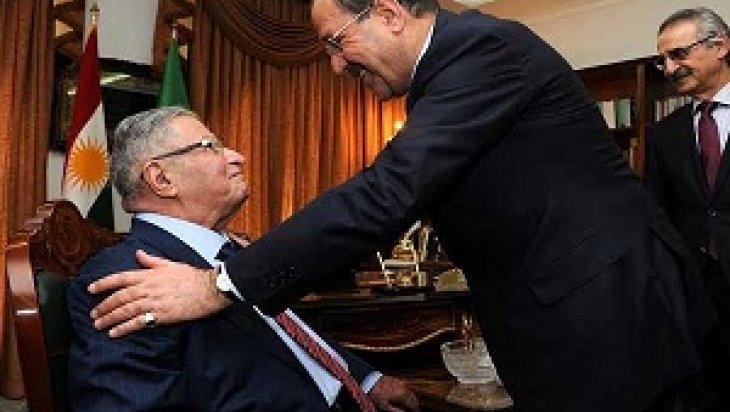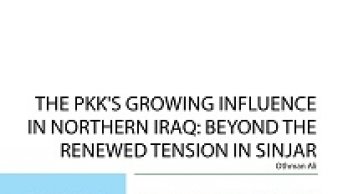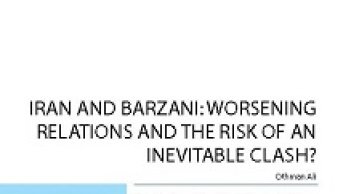Baghdad Assists Tehran in Dividing the KRG: Why Nouri al-Maliki visits Sulaymani

Recently, both Iran and Baghdad government have intensified their efforts to isolate Masud Barzani, the head of the Kurdistan Regional Government for a multitude of reasons. The foremost reason is Barzani's determined decision to hold a referendum in the KRG. Iran considers this move a threat to its national security and made it clear that it would not tolerate it. Iranian leaders are concerned about the destabilizing impact of Barzani's talk of independence on their Kurds. They view this move by Barzani oriented toward Israel as well. In addition, Iranians are exerting mounting pressure on Barzani to work closely with Baghdad government and the pro-Iranian Shiite militias in the coming battle to evict the ISIL from Mosul. So far, Barzani has indicated his intention to work with the US trained Iraqi army units and Turkish trained Sunni Hashed al-Watani to the exclusion of Shiite militias.
Furthermore, Iranian authorities think that Barzani is involved in a Saudi-Qatari design to destabilize Iran by instigating the Kurdistan Democratic Party of Iran (KDP-I) to re-start its armed clash with Iranian security forces in the frontier with Iraq. It is noteworthy that KDP-I had launched serious armed rebellion against the Islamic Republic during the years of 1979 -1999. Due to the internal division within KDPI and KRG leaders’ pressure on them, the KDPI had to cease their operations against Iran from the KRG controlled regions and confined her action to political means. During the last two months, KDPI has restarted its armed activities and waged numerous armed clashes against Iranian Revolutionary Guards units. Although these were done inside Iran and far from frontier with Iraq, Iranian officials had threatened Barzani with serious consequences if he does not put pressure on the KDP-I to end their activities inside Iran. For example on July 16, Mohsin Rezae, Secretary of the Expediency Council – an influential state body which Mr. Rafsanjani heads- stated to Iran Channel One TV that “unless Barzani ends his support for the terrorist group of KDP-I, we will start activities in northern Iraq to end his career and all Barzani’s movement”.
One has to bear in mind that since 2004 The Party of Free Life of Kurdistan (Partiya Jiyana Azad a Kurdistanê or PJAK), the Iranian branch of Kurdistan Workers Party (PKK), has established its firm control on the Iranian frontier with Iraq and has initiated an armed rebellion against Iran. Due to an understanding which was agreed upon between the PKK and Iranian authorities after the Syrian uprising, PJAK fighters had ceased their military activities in Iran and have been given the task of controlling the border with the KRG. It appears that under the pressure from the USA, the PJAK had allowed KDP-I fighters to enter Iran from KRG and wage serious armed clashes.
For these reasons, during the recent weeks, Tehran and Baghdad have intensified their efforts to weaken Masud Barzani and make division within the KRG. These have culminated in the controversial visit which Nouri al-Maliki, the ex-premier of Iraq and the leader of the powerful pro-Iranian State of Law bloc in the Iraqi parliament, paid a visit to Sulaimani. The visit was apparently to return an earlier visit which was paid by a delegation of the newly formed anti- Barzani bloc between Gorran and Patriotic Union of Kurdistan (PUK) to Baghdad. The Gorran-PUK delegation discussed the possibility of coordinating efforts with National Alliance (Shiite parties in Iraq) against Barzani. Al-Maliki held important meetings in Sulaimani with Nawsherwan Mustafa, the leader of Gorran and PUK Joint Committee. On 18 July, Mr. Nichervan Barzani, KRG PM, told Rudaw satellite TV that Maliki is unwelcome in Kurdistan and he is there to sow division within Kurds. Al-Maliki seems to have a clear mandate from Tehran and Baghdad to convince the Kurds to block Masud Barzani’s efforts to hold referendum in the KRG. In return, Kurdish leaders in Sulaimani will receive the 17% share of the KRG from Iraq’s annual budget. Should this agreement go through, all oil and gas production in the PUK-controlled region of the KRG will be delivered to Baghdad, in return for the fixed share which Sulaimani will receive instead of Erbil. Since 67% of all KRG oil and gas production is located in the PUK-controlled regions of Sulaimani, and Garmian provinces, as well as Kirkuk -which is effectively under the KRG control since 2014-, the deal will deliver a serious blow to Turkish and western companies which are currently involved in the KRG oil and gas production and export . This will most probably trigger new rounds of fighting among the Kurds in the KRG and will create a situation which may be very similar to the intra-Kurdish war of the 1990s. During the 1993-1998 intra-Kurdish fighting, Turkey had to make several cross-border operations deep inside the KRG to encounter the PKK and Iranian presence there, as well as broker a cease-fire among rival Kurdish factions.
It is noteworthy that Iran has already convinced the PUK and Gorran leaders to divert a considerable portion of the KRG oil to be exported to Iran via big oil tankers. According to the eye witnesses accounts, the number of oil tankers carrying the KRG oil to Iran has recently seen considerable increase and it amounts to 500 tankers per day. In addition, during last June, Sulaimani governor has paid a visit to Baghdad to reach a deal with al-Abadi government to pay the salaries of Kurdish employees of the province and to deliver to the province the much needed fuel and food. These are indications that Baghdad government has managed through its economic and political leverages to create cracks within the KRG.
However, Barzani has been firm on his stand that he will hold the referendum and gives no indication of succumbing to the mounting Iranian pressure. He has recently signed “a military understanding” with US government to pay for 50,000 Kurdish fighters which the KRG will provide for the battle for Mosul. Turkey has been equally determined that it will continue to assist Barzani in his policies not to yield to Baghdad and Tehran pressure.








